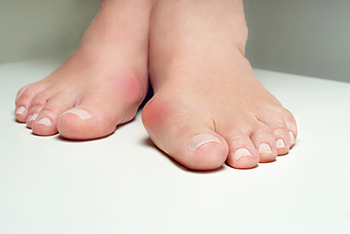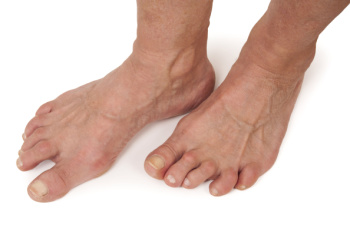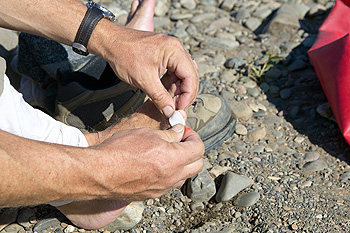Connect With Us
Blog

A bunion is a bony bump that forms at the base of the big toe when the joint becomes misaligned as the toe leans inward. This deformity often results from prolonged pressure on the foot, commonly due to wearing tight or ill-fitting shoes. Other causes include inherited foot structure, arthritis, or uneven weight distribution. Symptoms of a bunion include pain, swelling, redness, and restricted movement of the toe. Over time, the bump may become more prominent and uncomfortable, especially during walking or while wearing shoes. Risk factors include a family history of bunions, flat feet, and occupations or activities that place stress on the feet. Bunions may be uncomfortable, and it may become difficult completing daily activities. If this applies to you, it is suggested that you consult a podiatrist who can offer effective relief and treatment solutions.
If you are suffering from bunions, contact Pedram Aslmand, DPM of Advanced Foot and Ankle Center. Our podiatrist can provide the care you need to keep you pain-free and on your feet.
What Is a Bunion?
A bunion is formed of swollen tissue or an enlargement of boney growth, usually located at the base joint of the toe that connects to the foot. The swelling occurs due to the bones in the big toe shifting inward, which impacts the other toes of the foot. This causes the area around the base of the big toe to become inflamed and painful.
Why Do Bunions Form?
Genetics – Susceptibility to bunions are often hereditary
Stress on the feet – Poorly fitted and uncomfortable footwear that places stress on feet, such as heels, can worsen existing bunions
How Are Bunions Diagnosed?
Doctors often perform two tests – blood tests and x-rays – when trying to diagnose bunions, especially in the early stages of development. Blood tests help determine if the foot pain is being caused by something else, such as arthritis, while x-rays provide a clear picture of your bone structure to your doctor.
How Are Bunions Treated?
- Refrain from wearing heels or similar shoes that cause discomfort
- Select wider shoes that can provide more comfort and reduce pain
- Anti-inflammatory and pain management drugs
- Orthotics or foot inserts
- Surgery
If you have any questions, please feel free to contact our offices located in Long Beach, CA . We offer the newest diagnostic and treatment technologies for all your foot care needs.

Rheumatoid arthritis in the feet can lead to a range of symptoms that affect daily movement and comfort. This autoimmune condition often targets the metatarsophalangeal, or MTP, joint, along with joints in the toes, resulting in pain, stiffness, and swelling. Over time, such joint damage can alter foot structure, causing the arches to collapse and leading to flat feet. The shifting alignment of the toes may also contribute to the development of bunions and hammertoes. As pressure points change, thickened skin such as calluses may form on the soles or sides of the feet. These symptoms can make walking painful and reduce stability. Early recognition of these signs is essential for managing rheumatoid arthritis. If you are experiencing any of the above symptoms, it is suggested that you are under the care of a podiatrist who can help you to manage this serious and painful condition.
Because RA affects more than just your joints, including the joints in your feet and ankles, it is important to seek early diagnosis from your podiatrist if you feel like the pain in your feet might be caused by RA. For more information, contact Pedram Aslmand, DPM of Advanced Foot and Ankle Center. Our podiatrist will assist you with all of your podiatric concerns.
What Is Rheumatoid Arthritis?
Rheumatoid Arthritis (RA) is an autoimmune disorder in which the body’s own immune system attacks the membranes surrounding the joints. Inflammation of the lining and eventually the destruction of the joint’s cartilage and bone occur, causing severe pain and immobility.
Rheumatoid Arthritis of the Feet
Although RA usually attacks multiple bones and joints throughout the entire body, almost 90 percent of cases result in pain in the foot or ankle area.
Symptoms
- Swelling and pain in the feet
- Stiffness in the feet
- Pain on the ball or sole of feet
- Joint shift and deformation
Diagnosis
Quick diagnosis of RA in the feet is important so that the podiatrist can treat the area effectively. Your doctor will ask you about your medical history, occupation, and lifestyle to determine the origin of the condition. Rheumatoid Factor tests help to determine if someone is affected by the disease.
If you have any questions please feel free to contact our offices located in Long Beach, CA . We offer the newest diagnostic and treatment technologies for all your foot and ankle needs.

Blisters are a frequent issue for hikers and can make even the most enjoyable trek uncomfortable. They form when repeated pressure and friction cause the skin layers to separate, allowing fluid to accumulate as a protective response. Direct friction from ill-fitting boots or socks rubbing against the skin increases the risk of blister formation. Moisture from sweat or wet conditions softens the skin, making it more prone to irritation and damage. Extended hiking over rough or uneven terrain can further intensify these effects. Foot blisters can be painful, causing hiking to become difficult. If you have developed a blister while hiking, it is suggested that you visit a podiatrist who can offer you relief and preventative methods.
Blisters may appear as a single bubble or in a cluster. They can cause a lot of pain and may be filled with pus, blood, or watery serum. If your feet are hurting, contact Pedram Aslmand, DPM of Advanced Foot and Ankle Center. Our podiatrist can provide the care you need to keep you pain-free and on your feet.
Foot Blisters
Foot blisters are often the result of friction. This happens due to the constant rubbing from shoes, which can lead to pain.
What Are Foot Blisters?
A foot blister is a small fluid-filled pocket that forms on the upper-most layer of the skin. Blisters are filled with clear fluid and can lead to blood drainage or pus if the area becomes infected.
Symptoms
(Blister symptoms may vary depending on what is causing them)
- Bubble of skin filled with fluid
- Redness
- Moderate to severe pain
- Itching
Prevention & Treatment
In order to prevent blisters, you should be sure to wear comfortable shoes with socks that cushion your feet and absorb sweat. Breaking a blister open may increase your chances of developing an infection. However, if your blister breaks, you should wash the area with soap and water immediately and then apply a bandage to the affected area. If your blisters cause severe pain it is important that you call your podiatrist right away.
If you have any questions, please feel free to contact our offices located in Long Beach, CA . We offer the newest diagnostic and treatment technologies for all your foot care needs.


